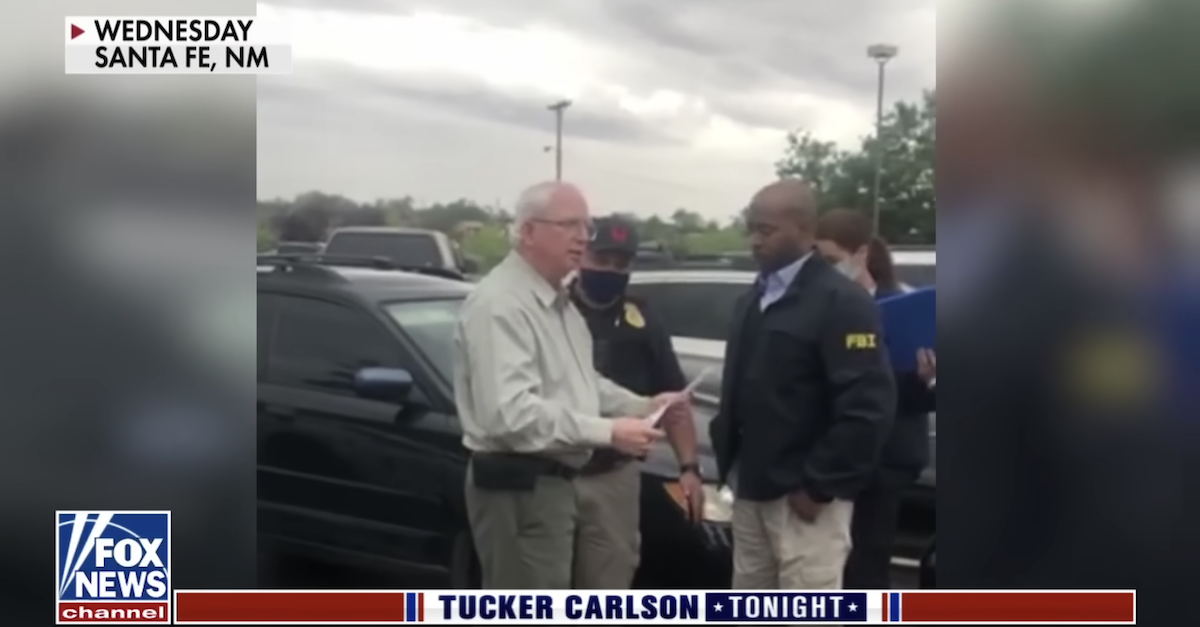
In a June 28, 2022, appearance on Tucker Carlson Tonight on Fox News, John Eastman shared video of himself being searched by federal agents on June 22 in New Mexico.
A New Mexico federal judge on Friday rejected John Eastman’s request to block the search of his seized phone in a federal criminal probe and order any information collected from it to be destroyed, saying Washington D.C. is the lawful jurisdiction to decide such an issue.
A 17-page order from Senior U.S. District Judge Robert C. Brack said the only issue for him to consider is whether Eastman is being harmed because he no longer physically possesses his phone, and Eastman didn’t argue he was.
The election lawyer for former President Donald Trump instead argued he was being harmed by the search and seizure of his phone, which he alleges is unlawful. But while the phone was seized from Eastman in New Mexico, the search of it was authorized under a warrant approved by a judge in the District of Columbia. It includes a protocol for a privilege-team — sometimes called a taint team — to review Eastman’s phone for possible attorney-client privilege material, which is standard in DOJ investigations.
“Eastman cites no authority to support a finding that he may collaterally attack the filter protocol in this district,” Brack wrote in Friday’s order. “The Court finds that Eastman has an adequate remedy for any injury due to the alleged First Amendment violation — he may file an appropriate motion before the court that approved the filter protocol.”
The order isn’t a total loss for Eastman, however: Brack ordered Eastman and DOJ lawyers “to communicate about a realistic timeline for return of the physical phone.”
“Although the Court declines to grant Eastman relief at this time, he is free to file an appropriate motion at some reasonable time in the future if the parties cannot come to an agreement on the matter,” Brack said.
Brack rejected Eastman’s argument about privileged material for the same reason he rejected his First Amendment violation claims, writing, “he is pressing this issue with the wrong court.”
“Should Eastman be concerned that the Government has access to material protected by the attorney-client privilege or work-product doctrine, he may file a motion for relief in the District of Columbia,” the judge in New Mexico said.
Brack previously signaled his views on the issue on Aug. 30 when he vacated a hearing scheduled for Sept. 6 in his Albuquerque courtroom, saying Eastman “cannot make a good faith argument” that a contested evidentiary issue exists.
Eastman is the one who announced his phone had been seized, filing a motion for a temporary restraining order in U.S. District Court in New Mexico in June. He then spoke with Fox News’ Tucker Carlson about the seizure and showed video of it, which occurred as he and his wife were exiting a restaurant in Santa Fe.
Brack declined to the TRO request but ordered the DOJ to tell where the phone is and whether they’d applied for a second warrant.
Just in: A judge in New Mexico has rejected John Eastman’s request to temporarily halt the federal search of his seized iPhone. 12-page order schedules briefing on his motion for an injunction. pic.twitter.com/7w9obzWNOI
— Meghann Cuniff (@meghanncuniff) July 15, 2022
DOJ lawyers said on July 27 that they had.
Eastman’s lawyers took issue with the fact that the phone was in the hands of the DOJ’s Office of Inspector General, which investigates DOJ employees. Eastman said the OIG isn’t authorized to investigate non-DOJ employees such as himself, but the DOJ said a search warrant aimed at recovering evidence of criminal conduct “says nothing about whether the person from whom an item is seized is a subject or target of a criminal investigation,” and Brack agreed.
And even if he didn’t, the judge said Eastman “cites no authority to support a finding that it would be appropriate to exclude evidence at this stage because a government agent exceeded his authority in procuring a warrant.”
Meanwhile, U.S. District Judge David O. Carter is considering a request by the Jan. 6 Committee for a final batch of emails and related documents from Eastman’s Chapman University account.
Generally speaking, warrants must name with particularity the places or persons to be searched and the items to be seized. The facts alleged must establish probable cause — a reasonable probability that evidence of a crime may most likely be found in the location named. However, as the DOJ noted, they may be aimed at people who are not criminal suspects.
Read Judge Brack’s full order here.
[Image via screenshot from Fox News/YouTube.]
Have a tip we should know? [email protected]